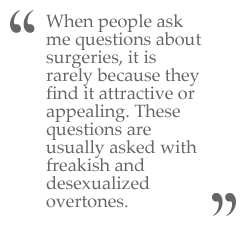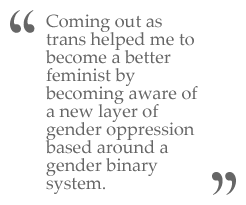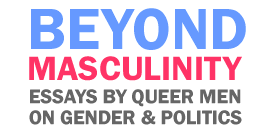 People are often fascinated by my physical
body, but it is usually in a way that strips away any
sexuality that I have. When people ask me questions
about surgeries, it is rarely because they find it
attractive or appealing. These questions are usually
asked with freakish and desexualized overtones. Often,
others try to reduce my identity to my physical body and
sexed characteristics, specifically to whether or not I
have a penis. After all, how can I even consider myself
a “man” (or, at least, “not woman”) when I don't have a
dick? Even when these questions are asked with the
implication of finding my non-binary body attractive, it
is often in a fetishistic way – reducing me and my body
to a fantasy waiting to be fulfilled. In the first case,
I am stripped of having any sexuality; in the second, I
become only a sexual object. Where is the happy medium?
People are often fascinated by my physical
body, but it is usually in a way that strips away any
sexuality that I have. When people ask me questions
about surgeries, it is rarely because they find it
attractive or appealing. These questions are usually
asked with freakish and desexualized overtones. Often,
others try to reduce my identity to my physical body and
sexed characteristics, specifically to whether or not I
have a penis. After all, how can I even consider myself
a “man” (or, at least, “not woman”) when I don't have a
dick? Even when these questions are asked with the
implication of finding my non-binary body attractive, it
is often in a fetishistic way – reducing me and my body
to a fantasy waiting to be fulfilled. In the first case,
I am stripped of having any sexuality; in the second, I
become only a sexual object. Where is the happy medium?
Even as a transperson I am supposed
to see my own body as non-attractive and deny my own
sexuality, according to the traditional medical
discourse. As Jason Cromwell argues in his essay
“Queering the Binaries,” “Within the narratives made
available through the medico-psychological literature
(and, for that matter, through published
autobiographies), both MTF and FTM transsexuals are
disgusted by and hate their genitalia, and, by
implication, sexual acts of any kind are considered
equally disgusting and abhorrent” (515). However, this
model of self-repulsion hardly reflects my own
experiences.
Before I started transitioning, I was
admittedly less comfortable with my body. Rather than
really thinking about my identity and its relation to my
physical self, I survived by ignoring my physical body
altogether. As I began exploring my gender identity, I
started questioning my investment in my physical self. I
began to really look at my body to see what it had to
offer and what I wished to change. When I began
testosterone injections, the gradual physical changes
gave me a heightened sense of self-awareness that
bordered on narcissistic. This obsession with my newly
discovered body was spurred on by my
testosterone-induced leap in libido. I became fixated on
exploring my sexuality.
While I had an aversion to vaginal
penetration before starting to transition, it fascinated
me once I moved into a more male-identified gender. I
had never slept with men as a woman, but I was more than
ready to explore that territory with queer men with my
altered body. My experience was similar to that of
author and activist David Harrison: “The whole point of
my gender transition was to free myself up. If something
feels good to me, I'm not going to stop doing it because
it doesn't fit someone else's notion of what a man is”
(132). I had found a way to feel more comfortable and
present in my body, and I was going to explore that in
every way that I could.
I also found it easier to explore
relationships and my sexuality once I began to
transition. Rather than making it impossible for me to
connect with people sexually, changing my body helped me
become more confident and comfortable with myself. My
confidence and comfort with my body went much further in
establishing relationships with people than my
discomfort with my strictly female body had allowed me
to do.
A challenge in establishing relationships
with partners, though, is dealing with labels and
identities. By this point, I have dated partners coming
from a variety of sexual identities: gay, lesbian,
queer, straight, bisexual, and/or something else
entirely. While labels can be useful in forming social
movements or conceptualizing ideas, they can become an
obstacle in forming relationships that aren't easily
categorized. If a gay man is in a relationship with me,
how does he negotiate his gay identity in relation to
his attraction to my body? How much do outside forces,
identity politics, and cultural norms play a role in his
response to his attraction to me? Sometimes, the outside
forces are too much to overcome and the relationship
quickly falters. Other times, my partners have been
readily accepting of and attracted to my physical body,
regardless of the implications toward a specific
identity label.
As a person outside of the male vs. female
gender binary, I struggle to assert myself in a gay vs.
straight world. I prefer fluid and inclusive sexuality
labels like “queer,” “pansexual,” or “omnisexual” to
describe myself and my sexuality in order to create
space for bodies outside of the binary to be visible and
desirable. By reclaiming our bodies as attractive
through physical alterations that we initiate, we are
able to create room for trans bodies to be attractive. I
have reconstructed my body through testosterone
injections in such a way that I am comfortable in living
in it, and presenting my nonconforming body as one that
can be sexually desired is a political act within
itself. In refusing to assimilate my body into the idea
of what a man's body or a woman's body should look like,
I am challenging society's ideas of gender and sexuality
on a very personal level.
Intersections
 Coming out as transgender did not mean that
I had to toss out my feminist politics; to the contrary,
coming out as trans helped me to become a better
feminist by becoming aware of a new layer of gender
oppression based around a gender binary system. While
some of my actions have been damaging, such as lying to
the medical industry in order to reach my personal
objectives, I have become aware of the problems with
these actions in the perception of transgender people as
a whole. Through accurately presenting myself to the
medical industry instead of assimilating into a strictly
defined role, I continue to complicate and expand any
narrow definition of what it means to be transgender.
Rather than choosing to pass as a “man” in all facets of
my life, it is important to me that I continue to out
myself – to become “posttranssexual” – in order to
effectively challenge the oppressive gender system
instead of reinforcing it. By claiming ownership of my
trans identity and my non-normative body, I am able to
become empowered in myself and to reclaim my sexuality.
Coming out as transgender did not mean that
I had to toss out my feminist politics; to the contrary,
coming out as trans helped me to become a better
feminist by becoming aware of a new layer of gender
oppression based around a gender binary system. While
some of my actions have been damaging, such as lying to
the medical industry in order to reach my personal
objectives, I have become aware of the problems with
these actions in the perception of transgender people as
a whole. Through accurately presenting myself to the
medical industry instead of assimilating into a strictly
defined role, I continue to complicate and expand any
narrow definition of what it means to be transgender.
Rather than choosing to pass as a “man” in all facets of
my life, it is important to me that I continue to out
myself – to become “posttranssexual” – in order to
effectively challenge the oppressive gender system
instead of reinforcing it. By claiming ownership of my
trans identity and my non-normative body, I am able to
become empowered in myself and to reclaim my sexuality.
Even though I may not know
precisely where my journey is taking me, it is important
for me to continue living my life in a way that feels
truthful to how I see myself and to my political
beliefs. I have yet to find a place where I feel
entirely comfortable, but I have been moving
progressively closer since I chose to begin addressing
my identity issues. As I navigate my way through
different gender expressions, I hope to get closer to
that elusive place where my identity, my politics, and
my physical self converge... (continue reading)




7 COMMENTS ON THIS ESSAY:
Thank you sincerely for writing this Elliot. There needs to be more voices, louder voices, describing the lived experiences of gender diversity. I identify as genderqueer (hey that comes up as a typo!) but struggled with my own identity politics for years before finding a community who understood and embraced the importance of screwing with the gender binary. Before I met these people I didn't have the words to articulate who or what I was, I really just didn't know.
Because I think education and choice and just plain old exposure to new ideas are so important I'm working on developing a drama based sex ed program for youth centred around roleplay and improv and drag and all kinds of fun stuff to create a platform to discuss sex and bodies and relationships, and of course, gender. Your essay gave me a new injection of energy towards that end and I will borrow your reference list for some more of the same!
Again, thank you.
Thanks for making me rethink transition. When I first read this, I wasn't sure about altering my body; I was afraid I'd become totally "male", something I didn't want to be.
You --and the other FTMs in this anthology-- succeeded in showing all the shades of color within the category "man".
Thank you so much, Elliot, for taking the time and trouble to write this. Your experience resonates with my own and I'm pleased to read some of my own ideas so clearly expressed! The very best in your journey, Felix. :-)
Hey I'm a male to female, I can't say I identify as a transsexual or anything, but it's certainly -part- of my identity. I confuse people as it is being a trans 'lesbian' in a relationship with a transwoman who has opted out of transitioning. I find that while I eventually want MtF surgery, I'm exploring my sexuality, I'm burdened with the stigma of being a "shemale" or some kind of sex object, and I find it hinders me in my own exploration of myself. I have, due to my preoperative state, a unique sexuality, that I, for the moment would like to embrace. Sometimes I feel like embracing that sexuality, leads me into becoming closer to the stereotype associated with transgendered women. Anyways I hope my comment is not too vulgar, I stumbled across this page by chance, and it helped me clarify my own thoughts.
Just LOVE this. I've been on T and transitioning to 'I know not where' for some months. This is exactly what I've been searching for in terms of peer support for really stepping outside of the binary. Thank you. Thank you. I feel as though I'm not alone in this decision to transition into myself, rather than some concept of myself.
You're an excellent writer, Elliot.
I'm a gay man (funny how we all feel the need to identify ourselves when commenting on writings about identity) and I admit I have a difficult time understanding well transgender issues. Part of this comes from my difficulty with labels in general; the other from a genuine ignorance of the emotional and intellectual mechanics involved. While I was often taken for being a girl (until I was about 14), I didn't embrace the mix up as you eventually did. I think it drove me into a place where I don't like to think of people in terms of sex or gender. I use neutral pronouns as often as possible -- I often say "person" instead of man or woman -- and it puts me kind of at odds with the idea of working so hard to embrace a gender identity. I suppose I simply wish they weren't there to begin with. :)
But thanks for bringing me at least a little closer to understanding.
Who were your childhood heroes, Elliot--more women or more men?
I am desperately searching for answers, myself. But there's an answer I want more than any other. I want to be a man, and I can't articulate why (which is weird, 'cause I'm a wordy guy) but so much in my past, in my family and friends, even in my own is blocking me. But the more they block me the more desperately I want it. I wish some sci-fi machine existed that would transform you body and brain. Because some important part of me is male, maybe the central part, yet I know I don't fit the benjamin standards. I watched Sailor Moon after G-force and Birdman went off the air. But Somehow I just want to be truly, wholly a man. I always wanted to be the male hero. I have a lot of issues with how soft and round my body is. BTW, anyone know how to convince a therapist to give you testosterone?
Mom doesn't want to go there. She wants her daughter back, she treats me like an invading stranger...how do I convince her that I suppressed half my person to be her little girl?
Sorry, needed to vent. I feel so angry at being feminized. I've learned to cry far too much.